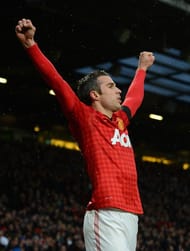March is just around the corner, which means football fans should prepare themselves for those season-ending clichés that commentators will inevitably start rolling out come matchday. Squeaky bum-time, the run-in, the final push – these are words that will be overused over the coming weeks. With more than two-thirds of the season behind us, only a few games remain in the top-tier domestic leagues as the curtains begin to fall on yet another exciting season of football. For some teams, it is a time for consolidation. For some, it’s about a last-gasp effort that could be the difference between relegation and survival. With big games coming thick and fast, March usually ends up as the make-or-break month. Traditionally, this is the point in the season when the contenders take hold of the reins and start to break away from the pretenders.
A quick look at the points tables of major European domestic leagues paints a picture not in keeping with tradition. If we talk of the 3 self-proclaimed best leagues in the world – the EPL, La Liga and Bundesliga – there is clear daylight between the leaders and the rest of the pack. In the EPL, Manchester United are 12 points clear at the top with 11 games remaining. Barcelona lead second-placed Atletico Madrid by the same margin in La Liga, albeit with 13 games still to be played. The Bundesliga, with its conspicuous 34-game seasons, sees Bayern Munich way out in front with a 17 point lead over defending champions Borussia Dortmund. Barring a meltdown of epic proportions for either on of the aforementioned clubs, they will all coast to the title; athough Manchester United and Sir Alex will probably not take their foot off the gas and will likely plough ahead with the same vigour till the title is a mathematical certainty, if only to ensure that last year’s Devon Loch-style collapse was only an exception and not the rule.
It’s an extremely rare scenario that the top-tier leagues of England, Germany and Spain are nothing but one-horse races where the spectators are only waiting for the inevitable to happen. Italy’s Serie A stands out in that respect, with Juventus’ 6 point lead over second-placed Napoli not being enough for the bookies to start paying out early on the Old Lady retaining the crown. The Italian league has a reputation of being boring and uneventful, but currently it’s the only major league which has anything of note to offer as far as the title race is concerned. The EPL, La Liga and Bundesliga, all three are seemingly done and dusted, and that is something we expect in late April or early May, but never as early as March.
So what to make of this aberration? Is it a sign of the growing disparity between the top teams and the rest of the league, or simply a case of three teams in near-perfect form? Have Manchester United really been 12 points better than City this season, or is the points gap just down to the exploits of the rampant Dutchman in their ranks? Bayern Munich’s recent Champions League masterclass at the Emirates has marked them out as one of the favourites for the competition, but can one honestly say they are 17 points better than Dortmund, a team that has been equally impressive in Europe and topped the “Group of Death”? Barcelona certainly don’t seem to be missing Guardiola; if anything, the departure of ‘Pep’ has been a breath of fresh air for a side that many declared had peaked last season, and the Blaugrana have been simply ruthless in their domestic campaign, having dropped only 7 points in 25 games.
Transfer Dealings: Compare and Contrast
The comfortable positions occupied by each league leader also highlights an issue that is now at the heart of any success experienced by big clubs – that of transfer dealings. Dortmund manager Jurgen Klopp had pointed out in November that his side, despite winning the league in consecutive seasons, could not be expected to spend as much as Bayern, and that the Bavarians remained the moneybags of Germany. The official transfer figures show the massive contrast between the two clubs in terms of money spent on new players. Bayern Munich spent close to ?62 million in the summer of 2012 to bring in the likes of Javi Martinez, Xherdan Shaqiri, Mario Mandzukic and Dante, whereas Dortmund’s transfer outlay in the same window was roughly ?23 million, of which ?15 million was spent on Marko Reus, a player bought to replace the England-bound Shinji Kagawa. Taking into account Kagawa’s ?14 million sale and the ?13 million earned from selling Ivan Perisic and Lucas Barrios, Dortmund effectively made a profit of close to ?5 million pounds in the summer transfer window, while replacing quality with quality at the same time. Overall, Bayern Munich spent ?60 million more than Dortmund before the season began. So the question needs to be asked – just how much of that excess money is responsible for the 17-point gap between the 2 clubs? The spine of Mandukic, Martinez and Dante has certainly added more quality to an already good Bayern Munich; some would go as far as to say that the trio have made the Bavarians a complete team.
Spain also throws up the same equation. Barcelona’s net spending in the summer transfer window was ?28 million, with Jordi Alba and Alex Song being the major acquisitions. Real Madrid had a big money signing of their own in Luka Modric, with the Croatian making his way to the Bernabeu and ?26 million going the other way to Spurs. But Madrid also sold quite a few players, most notably Esteban Granero to QPR (?7 million), Lassana Diarra to Anzhi (?4.5 million), Sergio Canales and Fernando Gago to Valencia (combined fee of ?10 million) and Hamit Altintop to Galatasaray (?3 million). Overall, Real Madrid broke even in the transfer market, a clear deviation from their usual transfer strategy. Here too, the team that spent more in the summer is the one running away with the league title.
The situation in England neither corroborates the theory nor disputes it. Man United spent ?52 million in the summer of 2012, of which ?41 million accounted for 2 players that went straight in to the playing eleven – Robin van Persie and Shinji Kagawa. The rest was spent on Nick Powell and Alexander Buttner – one a future prospect and one apparently bought to simply scare Patrice Evra straight – so it would be prudent to only take into account the figure of ?41 million for the sake of consistency. Proceeds from the sales of Berbatov and Park to Fulham and QPR respectively total ?7 million, bringing United’s net spend to ?34 million. Man City’s net spend is also in same region, as acquisitions of Javi Garcia (?17.5 million), Matija Nastasic (?13.5 million), Jack Rodwell (?13 million), Scott Sinclair (?6.5 million) and Maicon (3.5 million) bring the total to ?54 million, but the departures of Adam Johnson (?11 million), Adebayor (?6 million) and Nigel de Jong (?3 million) bring down the net spend to an estimated ?34 million. The two Manchester neighbours spent more or less the same money; it’s just that one had better returns on the investment than the other in the form of league points. And who’s to go against the tide and disagree with the consensus that Robin van Persie was always going to be of more value to United than Rodwell, Garcia et al were to be to City, and hence, render the comparison moot? Man United simply made a high-percentage signing more likely to offer immediate benefits, whereas City’s signings smacked of desperation and panic and, in hindsight, did not have near enough the same impact.
Plausible conclusion
Perhaps this is a simplistic way of looking at the situation. There must be other variables that contributed to the respective teams being at the top of their tables, and transfer dealings are just the tip of the iceberg. In a day and age where teams giving away the GDP of a third-world country on “buying” football players is a common occurrence, an extra ?30-odd million should, in theory, not make a big difference. If the difference between winning the title and finishing second was how much more you spent on players than your rivals, then Chelsea should have wrapped up the title by now, considering the fact that they had a net spend of ?88 million, more than double that of the Manchester giants. Maybe Roman Abramovich’s habitually ill-timed manager culling decisions offset Chelsea’s transfer largesse.
Reductive logic it may be, but the numbers add up and the theory holds true, atleast for time being. This season, when we talk of the EPL, La Liga and Bundesliga, the clubs that spent more money on players before the start of the season are the ones in pole position in their domestic campaigns. Who knew that there was actually value in the transfer market all along? Jokes aside, here’s hoping Napoli go against the odds and debunk the theory that in football, money wins you titles and that all you need to bring home a trophy is to have deeper pockets than your rivals.
*Transfer figures from http://www.transfermarkt.co.uk/en/. Only summer transfers have been taken into account.



